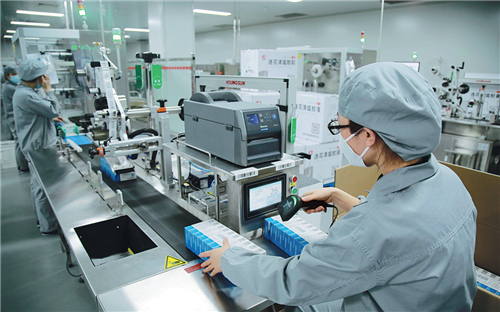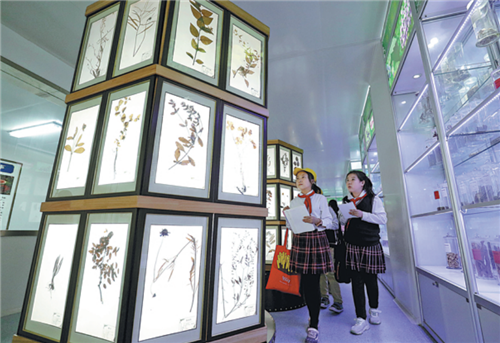Chinese medicine making inroads overseas

Employees work on a production line making Lianhua Qingwen, a TCM product, at a Shijiazhuang Yiling Pharmaceutical Co facility in Hebei province, in January. [Photo/Xinhua]
Millennia-old remedies gaining popularity among foreigners due to proven efficacy
Traditional Chinese medicine is furthering its development and increasing its overseas presence, thanks to supportive policies, according to industry experts and business leaders.
The country's master development plan for the 14th Five-Year Plan period (2021-25) aims to make better use of TCM in disease prevention, treatment and patient rehabilitation while promoting TCM innovation and development as well as strengthening its global presence.
During a recent inspection tour of Nanyang, Central China's Henan province, President Xi Jinping called for efforts to further develop TCM.
While visiting a memorial to Zhang Zhongjing, a famous Chinese pharmacologist and physician of the Eastern Han Dynasty (25-220), Xi said the Chinese nation has relied on TCM for medical treatment for thousands of years.
He also said efforts should be made to interpret the TCM mechanism and pharmacology with modern science and to incorporate both TCM and Western medicine into treatment, according to Xinhua News Agency.
The positive role TCM has been playing in the battle against the COVID-19 pandemic has increased international recognition of the traditional remedies Chinese people have been using for thousands of years, and policy support from authorities has added momentum to TCM's domestic and global development.
Yu Zhibin, director of the TCM department of the China Chamber of Commerce for Import and Export of Medicines and Health Products, spoke highly of policy measures that facilitate TCM trade and promote new business forms such as TCM-based medical tourism.
For instance, a new notice jointly released in May by seven central government departments, including the Ministry of Commerce and the National Administration of Traditional Chinese Medicine-which aims to promote high-quality development of TCM services export bases-have made breakthroughs in institutional innovations for TCM service trade facilitation, Yu said.
Many obstacles in areas such as investment, financing, commercial insurance applications, product deliveries and cross-border individual movement have been addressed, while public hospitals are encouraged to cooperate with private capital and provide quality services to those in need, he added.
"As COVID-19 still ravages around the world, TCM exports will contribute to containing the pandemic, and will also facilitate other countries to know more about Chinese culture to improve mutual understanding," Yu said.
Data from the chamber showed that TCM exports surged 14.5 percent on a yearly basis to about $1.13 billion during the first quarter. Total TCM exports in 2020 were $4.28 billion, up 6.6 percent year-on-year.
According to the National Administration of Traditional Chinese Medicine, since 2015, China began building 59 TCM international exchange and cooperation demonstration bases, and 30 overseas centers in the countries and regions involved in the Belt and Road Initiative.
Having collaborated with 88 countries and regions, the demonstration bases and overseas centers have served 150,000 foreigners, and provided training for 7,100 foreign professionals.
Zhang Yunling, executive vice-president of Hebei province-based Shijiazhuang Yiling Pharmaceutical Co, also said rollouts of government policies supporting the healthy development of TCM have injected new momentum into the ongoing global efforts of industry players.
The company has been strengthening strategies to shore up its business in overseas markets.
Through building a TCM product and services export base, the company has extended its presence in sectors such as TCM education, TCM export services and TCM medical tourism.
Within the next few years, the company plans to step up overseas TCM professional training, collaborate with domestic TCM pharmaceutical companies to export more quality TCM products and enhance services and promotions to attract more foreign visitors to its TCM resort.
"We are thrilled by the prospects of TCM products and services exports and feel proud to be part of it," she said.
The company's Lianhua Qingwen capsules, a patented TCM treatment for COVID-19 that has been included in the national clinical guidelines on COVID-19 diagnosis and treatment, has received registration approval in more than 23 countries and regions, including Canada, Brazil, Spain, Russia, Thailand and Kenya, as of the end of April.
Leveraging on its TCM expertise, the company's affiliate hospital has provided effective treatment to thousands of patients suffering from muscle atrophy. The patients are from 20 countries, including the United Kingdom, the United States, Germany and Russia.

Primary school students visit a herbarium of traditional Chinese medicines at an exhibition hall of Shijiazhuang Yiling Pharmaceutical Co in Hebei province. [Photo/Xinhua]
Its TCM resort, called "Yiling health city", also provides services to more than 200,000 domestic and foreign tourists.
Guangzhou Pharmaceutical Group, a State-owned pharmaceutical giant that specializes in TCM products and services, also believes TCM is going to have stronger presence in both domestic and global health sectors, underpinned by supportive policy.
During the 13th Five-Year Plan period (2016-20), the company successfully exported products to 26 countries and regions. A total of 50 products were registered overseas, covering 17 countries and regions, including Canada and Singapore.
The company set up a headquarters in Macao last year, aiming to better exploit the global market and investment opportunities. With a new subsidiary in Hengqin, a district of Zhuhai, Guangdong province, neighboring Macao, the company sees great potential in TCM medicine export and import trade in nearby regions and the economies involved in the Belt and Road Initiative.
It is setting up the largest TCM factory in Macao that conforms to good manufacturing practices or GMP standards, to produce a variety of TCM drugs and supplements.
However, Yu, with the China Chamber of Commerce for Import and Export of Medicines and Health Products, said cultural differences and legal barriers remain a challenge for TCM to make further inroads abroad.
The majority of TCM exports are products rather than services, and among the goods exports, the bulk is raw materials rather than patented drugs, Yu said.
He suggested market players enhance overseas sales channels to increase product exports, while at the same time build overseas subsidiaries in BRI economies and collaborate with locals to expand their business footprint.
It is also important to allocate resources globally and coordinate the development of TCM trade in both goods and services, he said.
